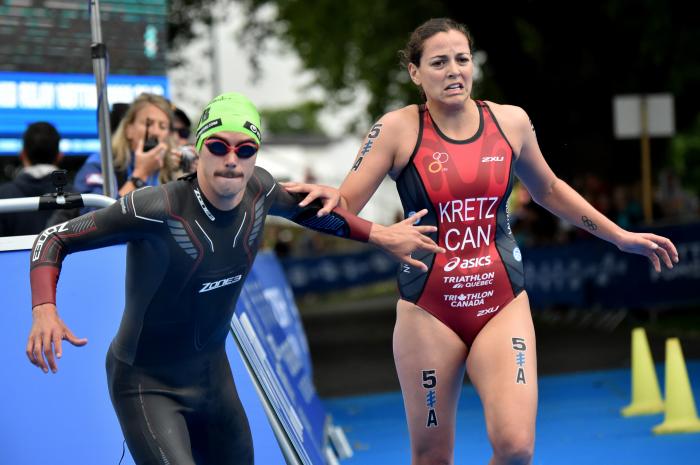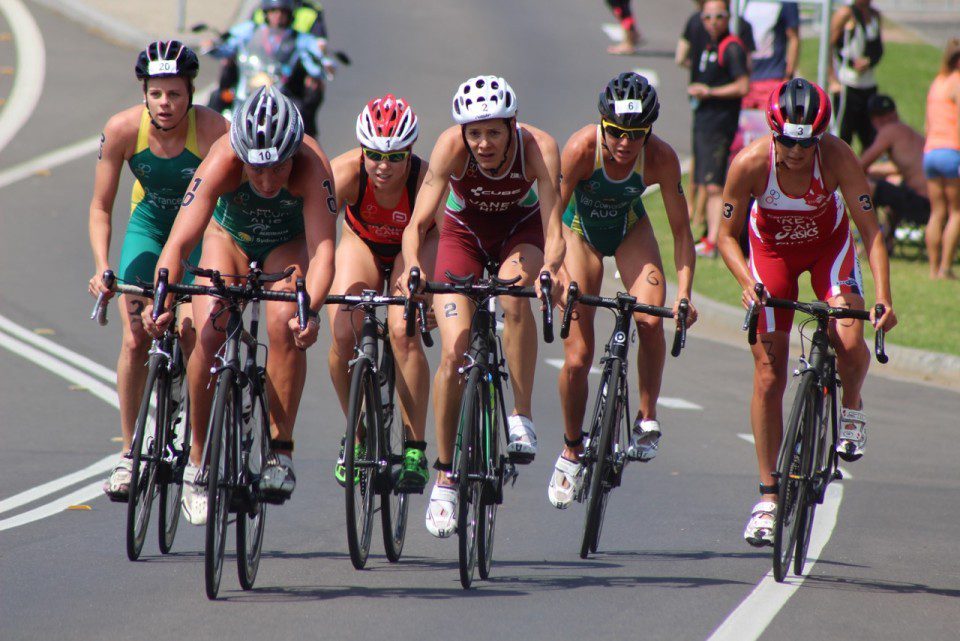Did Triathlon Canada give up on an Olympic relay team? Amelie Kretz says yes
Pandemic and shortened qualification window forces association to re-evaluate qualification criteria
 Photo by:
World Triathlon
Photo by:
World Triathlon
Earlier today the Canadian relay team was lapped out of the World Triathlon Mixed Relay Qualifcation Event, which will make the process of qualifying four athletes to the upcoming Olympics in Tokyo considerably more difficult. A podium finish in today’s race would have guaranteed Canada at least two men and two women on the start line in Tokyo – right now Canada has qualified two men and one woman for the Games.
The Canadian team competing in Lisbon at today’s qualification race included Emy Legault, Aiden Longcroft-Harris, Dominika Jamnicky and Martin Sobey, athletes who have competed on the world stage (Jamnicky represented Canada at the Commonwealth Games in 2018), but weren’t part of the Canadian team that finished fifth at the Mixed Relay World Championships in Hamburg in 2017 and 2019.
A week ago it looked like Canada would be fielding some of its top athletes in Lisbon, but by the time the official team roster was named that had all changed.
Canada’s Amelie Kretz, who competed at the 2016 Olympics in Rio, spoke to Sportcom, a Quebec-based website, about the situation yesterday, blaming Triathlon Canada’s Olympic selection process for the situation that saw our top relay competitors withdraw from today’s relay. (Joanna Brown, Canada’s top-ranked athlete, had to pull out due to an injury.)
Based on the Triathlon Canada Olympic selection criteria, Tyler Mislawchuk and Brown are likely to be on the Canadian team heading to Tokyo in July. Canada has qualified a second man based on Matthew Sharpe’s ranking. That spot is likely to go to either Sharpe or Alexis Lepage and, based on the selection criteria, will be determined, in part, by individual results at individual standard and sprint-distance World Triathlon events. That sets Sharpe and Lepage up for a head-to-head race for an Olympic spot tomorrow at the world cup event in Lisbon.
“When the people at Triathlon Canada selected this competition, they knew full well that the Olympic relay qualification was the day before, that it was the most important race for us and that it was our last chance to qualify,” Kretz told Sportcom. “They could have chosen another race (for men) than this one. It would have made more sense and we could have focused on the relay.”
While Kretz still has a chance to earn Canada a second qualifying spot at the Olympics this summer, her path to a second Olympic appearance would have been much easier had Canada earned a relay-team position. Kretz is also frustrated because, over the past few years, Canada has put a lot of emphasis on the relay competition.
“I’ve been told for two or three years that the relay is a priority and that I have to skip individual races to be fresher for the relay,” she told Sportcom. “I always did what they told me because I knew how important the relay is to the Olympics. And we have proven that we are good. Until March 2021, that was their priority and then it’s like it doesn’t exist anymore.”

COVID forces Triathlon Canada to re-evaluate qualification criteria
Triathlon Canada’s High Performance Director Eugene Liang is all-too-aware of how difficult the last year has been for athletes trying to qualify for the Olympics. “I actually really feel for the athletes – their road to chasing their Olympic dreams has been derailed by a once-in-a-lifetime pandemic,” he wrote in an email today. “Nobody can or could predict that, so I feel for each and every one of them. It is not easy for anyone of us right now. Many in the world are facing very difficult time’s and I think in our period of adversity we have to be grateful we are safe healthy and have the opportunity to even chase our dreams while doing a sport we all love.”
“As the governing body for triathlon in Canada, Triathlon Canada’s HP (high-performance) mandate is podium performances at the Games, other Major Games and World Championships,” Liang continued. “This hasn’t changed and is the driving force for our decision-making at the HP level as well as our strategic goal of Paris 2024 and beyond.”
“Upon reopening of qualification, our reality changed. COVID added an additional layer of risk and liability in conjunction with a very small window for qualification. We amended our criteria due to the unforeseen circumstances of a pandemic and reviewed the status of our podium priorities. With the inherent risk of travel, uncertain status of events, limited race opportunity, and the need to prioritize podium potential, athletes were provided revised pathways to nomination and afforded opportunities to make their own decisions. Triathlon Canada is not in the position to qualify an athlete’s decision-making when it comes to their own health and performance pathway. All eligible athletes for Olympic qualification events prior to the start of the reopening of qualification were informed of their choices, provided all risk assessments and information, communicated all rankings and event waitlists as well as internal evaluations of their Olympic rankings.”
Liang says that while Canada didn’t qualify a team in Lisbon, the Mixed Team Relay will continue to be an important part of the Triathlon Canada program.
“With Top 5 performances at World Championships and 2018 Commonwealth Games as well as a medal at the 2019 Pan Am Games, the Mixed Relay, in its various forms, will continue to evolve into an Olympic contender through the performances of our growing and maturing elite athlete pool,” he wrote. “With the postponement of the Games and reopening of qualification, we needed to reprioritize and maximize our podium chances whilst minimizing risk (health, performance, and travel). I am proud of all the athletes that have stepped up to race the relay over the past three (four with COVID postponement) years, culminating with the four young athletes here in Lisbon. Though we did not qualify a team, the individual efforts of each and every one of the athletes that toed the line for Canada over the past few years is not up for question or scrutiny. We will refocus our relay strategy to complement our continued individual strategy over the next few years as we target Paris.”

Olympic journey
When it became clear to Kretz that Canada wouldn’t be fielding its most competitive team in Lisbon, she made the decision to withdraw from the relay in order to rest and prepare for Sunday’s individual World Cup race in Lisbon. She currently sits in 87th place in the Olympic team rankings – based on the current Olympic field simulations, that puts her 10 positions behind South Africa’s Gillian Sanders, the last woman on the individual qualification list. She has three events to try and move herself up in the standings – this weekend’s race in Lisbon, the World Triathlon Cup Arzachena in Italy, and the World Triathlon Championship Series race in Leeds.
It’s not the first time Kretz will find herself in a last-minute drive to an Olympic spot – in 2016 it was her eighth-place finish at the final Olympic qualifying event in Yokohama that earned her a spot in Rio. If she is able to move up high enough in the rankings, Kretz will earn Canada a second spot at the Games, which also means Canada will be able to field a relay team as well. Since the spots are given to the federation as opposed to a specific athlete, she will need to meet Triathlon Canada’s qualification criteria to be named to the team.
